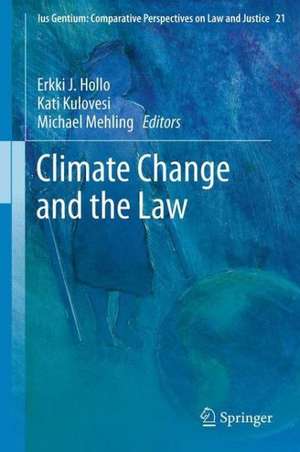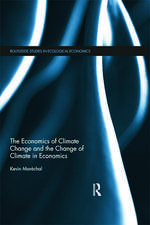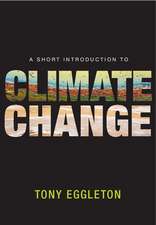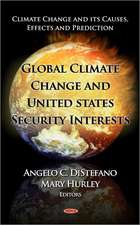Climate Change and the Law: Ius Gentium: Comparative Perspectives on Law and Justice, cartea 21
Editat de Erkki J. Hollo, Kati Kulovesi, Michael Mehlingen Limba Engleză Hardback – 4 dec 2012
In a remarkably short time span, climate change has become deeply embedded in important areas of the law. As a global challenge calling for collective action, climate change has elicited substantial rulemaking at the international plane, percolating through the broader legal system to the regional, national and local levels. More than other areas of law, the normative and practical framework dedicated to climate change has embraced new instruments and softened traditional boundaries between formal and informal, public and private, substantive and procedural; so ubiquitous is the reach of relevant rules nowadays that scholars routinely devote attention to the intersection of climate change and more established fields of legal study, such as international trade law.
Climate Change and the Law explores the rich diversity of international, regional, national, sub-national and transnational legal responses to climate change. Is climate law emerging as a new legal discipline? If so, what shared objectives and concepts define it? How does climate law relate to other areas of law? Such questions lie at the heart of this new book, whose thirty chapters cover doctrinal questions as well as a range of thematic and regional case studies. As Christiana Figueres, Executive Secretary of the United Nations Framework Convention on Climate Change (UNFCCC), states in her preface, these chapters collectively provide a “review of the emergence of a newdiscipline, its core principles and legal techniques, and its relationship and potential interaction with other disciplines.”
| Toate formatele și edițiile | Preț | Express |
|---|---|---|
| Paperback (1) | 1672.16 lei 6-8 săpt. | |
| SPRINGER NETHERLANDS – 23 aug 2016 | 1672.16 lei 6-8 săpt. | |
| Hardback (1) | 1565.15 lei 3-5 săpt. | +43.25 lei 7-13 zile |
| SPRINGER NETHERLANDS – 4 dec 2012 | 1565.15 lei 3-5 săpt. | +43.25 lei 7-13 zile |
Din seria Ius Gentium: Comparative Perspectives on Law and Justice
- 20%
 Preț: 1128.14 lei
Preț: 1128.14 lei - 18%
 Preț: 1115.28 lei
Preț: 1115.28 lei - 18%
 Preț: 904.28 lei
Preț: 904.28 lei - 18%
 Preț: 1001.81 lei
Preț: 1001.81 lei -
 Preț: 180.18 lei
Preț: 180.18 lei - 24%
 Preț: 787.30 lei
Preț: 787.30 lei - 18%
 Preț: 1115.28 lei
Preț: 1115.28 lei - 15%
 Preț: 635.31 lei
Preț: 635.31 lei - 18%
 Preț: 1108.67 lei
Preț: 1108.67 lei - 18%
 Preț: 1007.97 lei
Preț: 1007.97 lei - 18%
 Preț: 784.79 lei
Preț: 784.79 lei - 18%
 Preț: 1223.11 lei
Preț: 1223.11 lei - 18%
 Preț: 891.02 lei
Preț: 891.02 lei - 18%
 Preț: 1009.40 lei
Preț: 1009.40 lei - 18%
 Preț: 1005.74 lei
Preț: 1005.74 lei - 18%
 Preț: 1014.89 lei
Preț: 1014.89 lei - 18%
 Preț: 896.70 lei
Preț: 896.70 lei - 15%
 Preț: 641.85 lei
Preț: 641.85 lei - 18%
 Preț: 779.71 lei
Preț: 779.71 lei - 18%
 Preț: 1010.79 lei
Preț: 1010.79 lei - 18%
 Preț: 1010.03 lei
Preț: 1010.03 lei - 18%
 Preț: 950.52 lei
Preț: 950.52 lei - 15%
 Preț: 638.76 lei
Preț: 638.76 lei - 18%
 Preț: 947.50 lei
Preț: 947.50 lei - 20%
 Preț: 564.76 lei
Preț: 564.76 lei - 18%
 Preț: 1115.14 lei
Preț: 1115.14 lei - 18%
 Preț: 939.42 lei
Preț: 939.42 lei - 15%
 Preț: 635.80 lei
Preț: 635.80 lei - 15%
 Preț: 637.59 lei
Preț: 637.59 lei - 15%
 Preț: 643.65 lei
Preț: 643.65 lei - 24%
 Preț: 809.15 lei
Preț: 809.15 lei
Preț: 1565.15 lei
Preț vechi: 1956.44 lei
-20% Nou
Puncte Express: 2348
Preț estimativ în valută:
299.48€ • 312.69$ • 247.87£
299.48€ • 312.69$ • 247.87£
Carte disponibilă
Livrare economică 14-28 martie
Livrare express 28 februarie-06 martie pentru 53.24 lei
Preluare comenzi: 021 569.72.76
Specificații
ISBN-13: 9789400754393
ISBN-10: 9400754396
Pagini: 716
Ilustrații: XXI, 693 p.
Dimensiuni: 155 x 235 x 44 mm
Greutate: 1.11 kg
Ediția:2013
Editura: SPRINGER NETHERLANDS
Colecția Springer
Seria Ius Gentium: Comparative Perspectives on Law and Justice
Locul publicării:Dordrecht, Netherlands
ISBN-10: 9400754396
Pagini: 716
Ilustrații: XXI, 693 p.
Dimensiuni: 155 x 235 x 44 mm
Greutate: 1.11 kg
Ediția:2013
Editura: SPRINGER NETHERLANDS
Colecția Springer
Seria Ius Gentium: Comparative Perspectives on Law and Justice
Locul publicării:Dordrecht, Netherlands
Public țintă
ResearchCuprins
Table of Contents.- Contributors.- Abbreviations.- 1. Introduction: Climate Change and the Law; Erkki J. Hollo, Kati Kulovesi and Michael Mehling.- Part I: Climate Law as an Emerging Discipline.- 2. Implementing Climate Law: Instrument Choice and Interaction; Michael Mehling.- 3. Exploring the Landscape of Climate Law and Scholarship: Two Emerging Trends; Kati Kulovesi.- 4. Climate Change and Justice: Perspectives of Legal Theory; Felix Ekardt.- Part II: International Climate Law.- Section I: Architecture and Institutions.- 5. Foundations of International Climate Law: Objectives, Principles and Methods; Rowena Maguire.- 6. Alternative Venues of Climate Cooperation: An Institutional Perspective; Camilla Bausch and Michael Mehling.- 7. Analyzing Soft Law and Hard Law in Climate Change; Antto Vihma.- 8. Compliance and Enforcement in the Climate Change Regime; Meinhard Doelle.- Section II: Cross-Cutting Issues.- 9. The New Framework for Climate Finance under the United Nations Framework Convention on Climate Change: A Breakthrough or an Empty Promise?; Yulia Yamineva and Kati Kulovesi.- 10. Climate Justice: The Clean Development Mechanism as a Case Study; Tomilola Eni-ibukun.- 11. Legal Aspects of Climate Change Adaptation; Jonathan Verschuuren.- 12. Climate Change and Human Rights; Timo Koivurova, Sébastien Duyck and Leena Heinämäki.- Section III: Sectoral Issues.- 13. Managing the Fragmentation of International Climate Law; Harro van Asselt.- 14. No Need to Reinvent the Wheel for a Human Rights-Based Approach to Tackling Climate Change: The Contribution of International Biodiversity Law; Elisa Morgera.- 15. The Role of REDD in the Harmonization of Overlapping International Obligations; Annalisa Savaresi.- 16. Climate Change and Trade: At the Intersection of Two International Legal Regimes; Kati Kulovesi.- 17. Climate Law and Geoengineering; Ralph Bodle.- Part III: Comparative Climate Law.- 18. Climate Law in the United States: Facing Structural andProcedural Barriers; Michael Mehling and David Frenkil.- 19. Canada and the Kyoto Protocol: An Aesop Fable; Jane Matthews Glenn and Jose Otero.- 20. Climate Law in the European Union: Accidental Success or Deliberate Leadership?; Michael Mehling and Kati Kulovesi.- 21. Climate Law in Germany; Felix Ekardt.- 22. Climate Law in the United Kingdom; Colin T. Reid.- 23. Climate Law and Policy in Russia: A Peasant Needs Thunder to Cross Himself and Wonder; Yulia Yamineva.- 24. Australia: From ‘No Regrets’ to A Clean Energy Future?; Sharon Mascher and David Hodgkinson.- 25. Climate Law and Policy in Japan; Hitomi Kimura.- 26. Sustainable Development and Climate Policy and Law in China; Christopher Tung.- 27. India’s Evolving Climate Change Strategy; Namrata Patodia Rastogi.- 28. Climate Change Responses in South Africa; Ed Couzens and Michael Kidd.- 29. Climate Change Policy and Legislation in Brazil; Haroldo Machado Filho.- 30. Climate Law in Latin American Countries; Soledad Aguilar and Eugenia Recio.
Recenzii
From the reviews:
“This edited collection provides a unique contribution to the scholarship debate on climate change. … This volume is thus a solid collection of pieces which I would certainly recommend to anyone who wish to gain an improved understanding of the complex web of legal norms addressing climate change. … the book also represents an interesting reference tool for policy makers and practitioners involved in the ongoing discussions on climate change regulation and governance.” (Emanuela Orlando, Cambridge Law Journal, Vol. 72 (3), November, 2013)
“This edited collection provides a unique contribution to the scholarship debate on climate change. … This volume is thus a solid collection of pieces which I would certainly recommend to anyone who wish to gain an improved understanding of the complex web of legal norms addressing climate change. … the book also represents an interesting reference tool for policy makers and practitioners involved in the ongoing discussions on climate change regulation and governance.” (Emanuela Orlando, Cambridge Law Journal, Vol. 72 (3), November, 2013)
Textul de pe ultima copertă
Climate Change and the Law is the first scholarly effort to systematically address doctrinal issues related to climate law as an emergent legal discipline. It assembles some of the most recognized experts in the field to identify relevant trends and common themes from a variety of geographic and professional perspectives.
In a remarkably short time span, climate change has become deeply embedded in important areas of the law. As a global challenge calling for collective action, climate change has elicited substantial rulemaking at the international plane, percolating through the broader legal system to the regional, national and local levels. More than other areas of law, the normative and practical framework dedicated to climate change has embraced new instruments and softened traditional boundaries between formal and informal, public and private, substantive and procedural; so ubiquitous is the reach of relevant rules nowadays that scholars routinely devote attention to the intersection of climate change and more established fields of legal study, such as international trade law.
Climate Change and the Law explores the rich diversity of international, regional, national, sub-national and transnational legal responses to climate change. Is climate law emerging as a new legal discipline? If so, what shared objectives and concepts define it? How does climate law relate to other areas of law? Such questions lie at the heart of this new book, whose thirty chapters cover doctrinal questions as well as a range of thematic and regional case studies. As Christiana Figueres, Executive Secretary of the United Nations Framework Convention on Climate Change (UNFCCC), states in her preface, these chapters collectively provide a “review of the emergence of a new discipline, its core principles and legal techniques, and its relationship and potential interaction with other disciplines.”
In a remarkably short time span, climate change has become deeply embedded in important areas of the law. As a global challenge calling for collective action, climate change has elicited substantial rulemaking at the international plane, percolating through the broader legal system to the regional, national and local levels. More than other areas of law, the normative and practical framework dedicated to climate change has embraced new instruments and softened traditional boundaries between formal and informal, public and private, substantive and procedural; so ubiquitous is the reach of relevant rules nowadays that scholars routinely devote attention to the intersection of climate change and more established fields of legal study, such as international trade law.
Climate Change and the Law explores the rich diversity of international, regional, national, sub-national and transnational legal responses to climate change. Is climate law emerging as a new legal discipline? If so, what shared objectives and concepts define it? How does climate law relate to other areas of law? Such questions lie at the heart of this new book, whose thirty chapters cover doctrinal questions as well as a range of thematic and regional case studies. As Christiana Figueres, Executive Secretary of the United Nations Framework Convention on Climate Change (UNFCCC), states in her preface, these chapters collectively provide a “review of the emergence of a new discipline, its core principles and legal techniques, and its relationship and potential interaction with other disciplines.”
Caracteristici
Offers comprehensive and up to date presentation of climate and related energy law Expert writings, based on comparative research results Is essential reading for the methodology of “Climate Law” Includes full documentation of sources, concepts and literature













